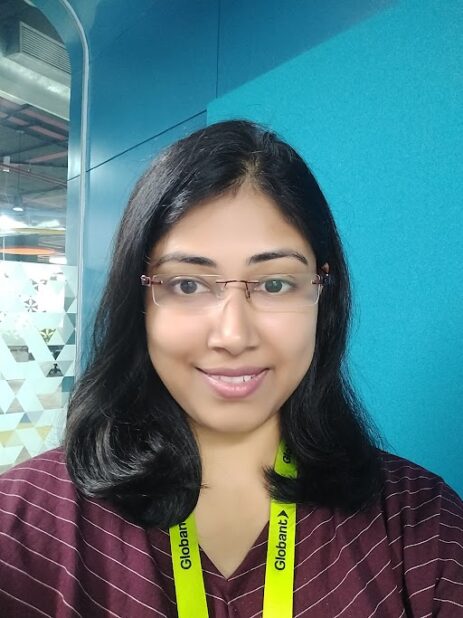Salesforce is the platform that helps companies connect with customers in exciting new ways. But behind every great project is a team making the magic—and a leader paving the way forward.

Tell me about your role at Globant.
I’m a technical architect with the Salesforce Studio in India, working in healthcare. My main responsibility is understanding my client’s business requirements and working with them to design a solution that will deliver the best possible outcomes. Often, this work comes down to two main things: improving platform performance and integrity and/or enhancing data quality, and ensuring data integrations work as designed.
In my role, I work directly with clients and serve as a team leader and mentor, helping others within the Salesforce Studio build the skills to advance their careers. I currently have three people on my immediate team and work closely with about 10 others. As part of my role, I also assist in building the Salesforce capability in India through events, learning opportunities, and team building.
What might a typical engagement look like?
A typical engagement often involves guiding organizations through setup or updates and implementing the best practices to enable better platform performance. Companies often implemented Salesforce a decade ago, so we work with clients to modernize their instances and help them draw as much value as possible from their investments.
Another issue we often run into is the data strategy. Companies may be storing a lot of old data or using old processes, so I work with them to improve the data quality, optimize system performance, and improve data usability. This sometimes involves working with other Studios at Globant, such as our Data & AI Studio, and leaning on their domain expertise to create a custom solution for our client.
Most recently, I’ve been working with clients to help them use the CRM system as a one-stop center and master database for all customer information by integrating different solutions and third-party systems within Salesforce.
When did you join the Salesforce Studio and what brought you to Globant?
I joined Globant in 2015 as a senior developer for the Salesforce Studio in India. At the time, I had about five years of experience with the Salesforce platform and was looking for a company where I could advance my career and develop my leadership skills.
One interesting thing about my history with the company is that when I started my role, I was the first hire on the Salesforce team in India. The rest of the team was situated in Argentina and Columbia. Initially, I was a little anxious about how I would manage as a remote employee, but I was very fortunate to have a wonderful team leader and project manager who was always there to help me, mentor me, and guide me.
You’ve been with Globant for almost eight years. What keeps you motivated to stay?
I find my work in the Salesforce Studio very interesting. In the healthcare industry, things are always changing, technology is always evolving. So even when I have been working on the same account or domain for many years, it never feels monotonous because we are always working to bring in new enhancements and improvements. There is an element of learning that always keeps things fresh. That’s also true because of our multi-studio model. Working at an organization like Globant, I regularly interact with different digital, creative, enterprise and reinvention Studios, allowing me to learn about different industries, technologies, platforms, and domains.
For example, with every client, I need to take time to understand the business needs, whether that means accessing a new market, integrating a new system with the CRM, or, now, leveraging new technologies like generative AI. Actually, AI is something that I remember being a topic of conversation at Globant when I joined in 2015. We had training and tools—we were a mile ahead in terms of using that technology to fuel reinvention. We’re very much a next-gen company, and that keeps my job exciting.
Other than your work with clients, what are some things you enjoy about your time at Globant?
The best thing about working at Globant is the leadership team. They are encouraging and helpful in creating a path for more leaders, including women leaders.
My leadership journey started at Globant, and I give so much credit to my managers for facilitating that by providing me with opportunities that align with my aspirations. For example, I recently helped organize and lead the first-ever Women in AI talk on Salesforce Day in Pune, India. A group of us came together to create awareness of adopting this technology as quickly as possible across accounts and industries and how to do so safely and securely. We also wanted to encourage women, in particular, to play a visible role in this transformation.
This idea of developing the next generation of leaders is something that I try to continue to support by making space for others and nurturing the skills that are important to our organization and our clients.
What skills and qualities do you think are important to nurture in others on the Salesforce team?
I look for three main things when interviewing candidates. The first is a fundamental understanding of the Salesforce platform. The technologies are changing frequently, so it’s really important to have strong technical roots to let you layer new developments.
The second thing I look for is a great attitude to learn, relearn, and even unlearn in some cases. Learning is a continuous process. It’s really an art to know when you need to go back and strengthen skills, build new ones, or accept a new way of doing things. You can’t be rigid if you want to work on a dynamic platform like Salesforce or for a next-gen company like Globant. You have to be willing to learn and evolve.
Finally, I think it’s important for people to be a culture fit—meaning they need to personally identify and align with the purpose and values of the team and the organization. This is so important to our Salesforce Studio team in India because we are in the process of building our credentials on a global level. We are growing, we are evolving, and it is critical for every member, and every individual to support our mission as a team and as a company. We want people to be able to advance their own careers and also play a role in helping the company itself grow—to be more visible in the market and to establish a reputation as the very best Salesforce partner in the world.
Ready to join Apala and the Salesforce Studio in India? Check out our open job positions today.
The Salesforce Studio Spotlight is a new Q&A series that showcases the tremendous talent of the Salesforce Studio team and the value they bring to our clients and the Salesforce partnership. This series will feature a diverse group of Globers, across all geographies, levels and positions and highlight their unique contributions and achievements, as well as their current projects and goals. Stay tuned to learn more about our Salesforce Studio team members and how they are working to deliver outstanding value to our clients through the Salesforce platform.




